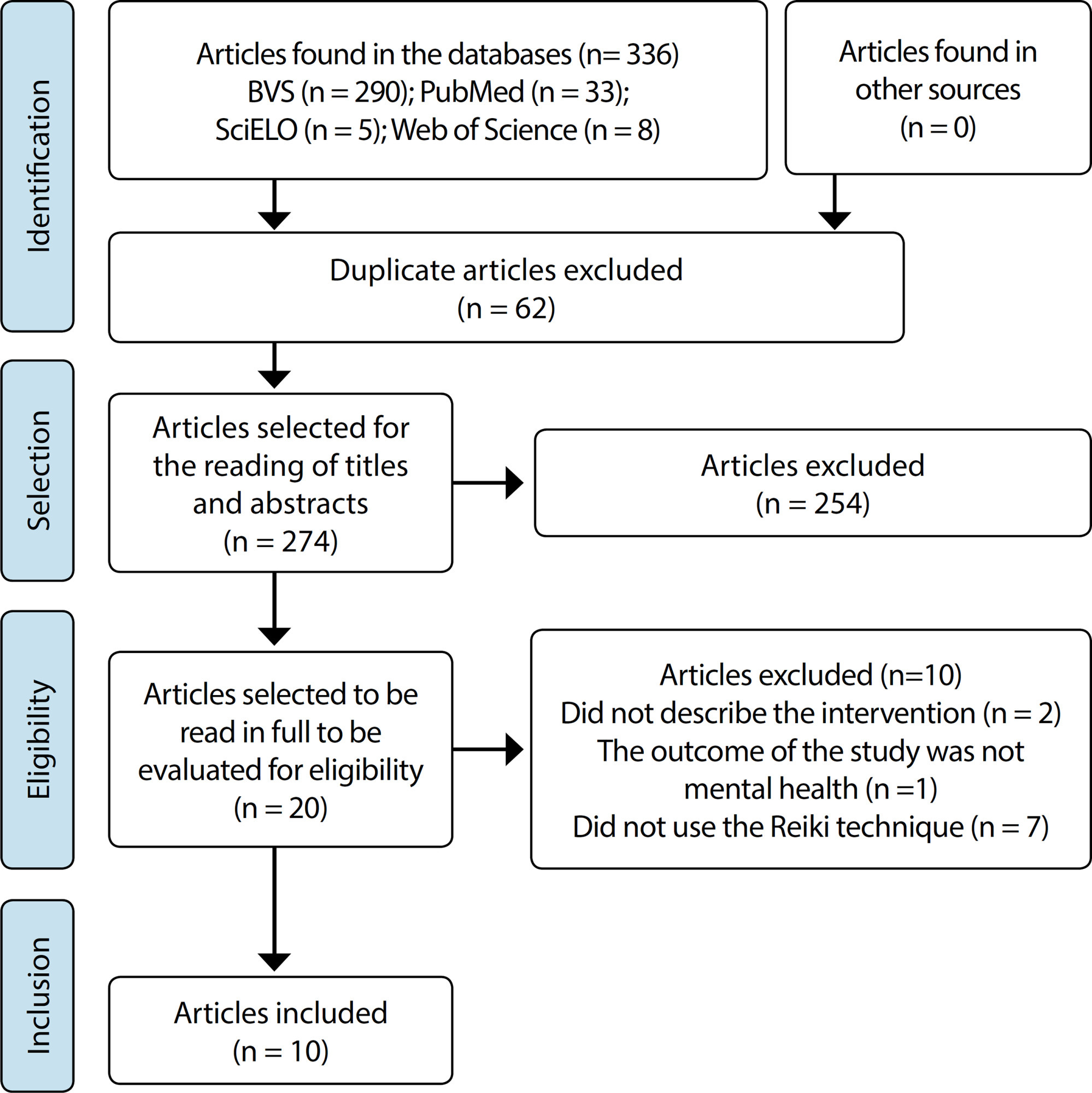-
ORIGINAL ARTICLE
Reiki for promotion of health and sleep quality in hospital nursing professionals
Revista Brasileira de Enfermagem. 2022;75(5):e20210535
08-15-2022
Resumo
ORIGINAL ARTICLEReiki for promotion of health and sleep quality in hospital nursing professionals
Revista Brasileira de Enfermagem. 2022;75(5):e20210535
08-15-2022DOI 10.1590/0034-7167-2021-0535
Visualizações0Ver maisABSTRACT
Objectives:
to know the repercussions of a Reiki therapy intervention on the sleep quality of nursing professionals working in a general hospital.
Methods:
a qualitative-quantitative study conducted with 16 professionals from the nursing team of a hospital in northwest Paraná, who participated in an intervention consisting of six weekly Reiki sessions. Data collected from September, 2019 to March, 2020 through semi-structured interviews and application of the Pittsburgh Sleep Quality Index before and after the intervention.
Results:
better sleep quality, characterized by a reduction in the time to fall asleep and in nightmares, and an increase in sleeping hours.
Conclusions:
reiki intervention had a positive impact on the sleep quality of participants.
-
REVIEW
Reiki as nursing care to people in mental suffering: an integrative review
Revista Brasileira de Enfermagem. 2021;74(suppl 3):e20200458
04-28-2021
Resumo
REVIEWReiki as nursing care to people in mental suffering: an integrative review
Revista Brasileira de Enfermagem. 2021;74(suppl 3):e20200458
04-28-2021DOI 10.1590/0034-7167-2020-0458
Visualizações0Ver maisABSTRACT
Objective:
To analyze the scientific evidences of the use of Reiki as a care strategy to people in mental suffering.
Methods:
Integrative review in the databases PubMed, Scielo, Web of Science, and BVS. The study included articles in English, Portuguese, and Spanish, with no time restriction, which answer to the guiding question that was created in accordance to the PICo strategy: “What are the scientific evidences on the use of Reiki as a care strategy to people in mental suffering?” Gray literature was not considered.
Results:
Ten articles made up the final sample. The use of the Reiki therapy had benefits as a strategy to care for stress, anxiety, depressive symptoms, pain relief, and quality of life improvements, whether the therapy was used isolated or to complement other treatments.
Conclusion:
The development of the competence of nurses and other health professionals in the use of Reiki can contribute to improve the quality standards of care.

-
ORIGINAL ARTICLE
Reiki therapy in the Unified Health System: meanings and experiences in integral health care
Revista Brasileira de Enfermagem. 2021;74(1):e20190816
03-24-2021
Resumo
ORIGINAL ARTICLEReiki therapy in the Unified Health System: meanings and experiences in integral health care
Revista Brasileira de Enfermagem. 2021;74(1):e20190816
03-24-2021DOI 10.1590/0034-7167-2019-0816
Visualizações0ABSTRACT
Objectives:
to understand the meanings of Reiki therapy in the Unified Health System, based on the experiences of users and therapists.
Methods:
thematic oral history study, conducted with 12 users and 11 Reiki therapists, in three public health services, in the city of São Paulo, SP, in 2018. The interviews were transcribed and categorized, through thematic content analysis, with the help of the Atlas.ti software.
Results:
for the interviewees, Reiki activates a universal energy, offering benefits to the body, mind, and spirit. The engagement of therapists in such practice was motivated by the desire to carry out voluntary work. Users claim to seek this therapy to overcome a state of suffering and use natural practices.
Final Considerations:
the meanings and experiences with Reiki therapy are many, but they converge in the understanding of this practice as a producer of health, well-being, and quality of life, through care centered on the integral human being.
Palavras-chave: Complementary TherapiesComprehensive Integral HealthcareQualitative ResearchTherapeutic TouchUnified Health SystemVer mais -
ORIGINAL ARTICLE
Comprehensive care from the perspective of nurses: an ecosystem approach
Revista Brasileira de Enfermagem. 2020;73(suppl 6):e20190781
12-21-2020
Resumo
ORIGINAL ARTICLEComprehensive care from the perspective of nurses: an ecosystem approach
Revista Brasileira de Enfermagem. 2020;73(suppl 6):e20190781
12-21-2020DOI 10.1590/0034-7167-2019-0781
Visualizações0Ver maisABSTRACT
Objectives:
to verify nurses’ perceptions about comprehensive care to human beings from the ecosystem perspective, with Therapeutic Touch use.
Methods:
an exploratory-descriptive, qualitative study, conducted with 11 nurses who use/used Therapeutic Touch in daily work. Data were collected through online semi-structured interviews and submitted to discursive textual analysis. The ecosystem framework was used.
Results:
participants talked about the theme in a polysemic way, but understand that comprehensive care is associated with nursing professionals and intrinsic in their being and doing, considering the philosophical theoretical bases of nursing, which aim at the comprehensiveness of being.
Final Considerations:
Therapeutic Touch was considered as a way to achieve comprehensive care caring to human being ins. The objective of the study was achieved; however, it is understood the need for other research to advance this knowledge and enable innovations in professional practice of nurses.



